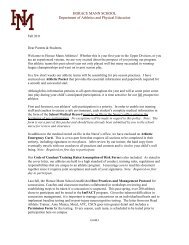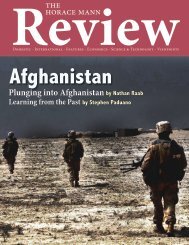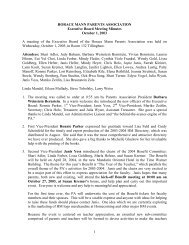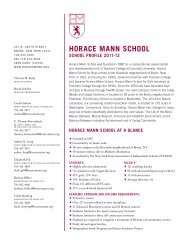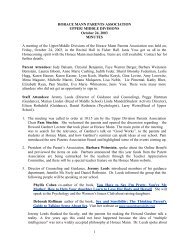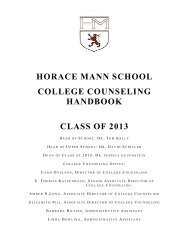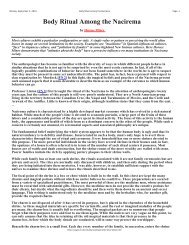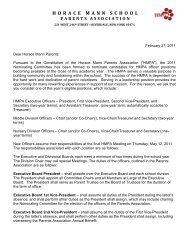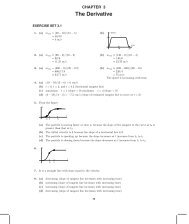ATHLETIC HANDBOOK - Horace Mann School
ATHLETIC HANDBOOK - Horace Mann School
ATHLETIC HANDBOOK - Horace Mann School
Create successful ePaper yourself
Turn your PDF publications into a flip-book with our unique Google optimized e-Paper software.
<strong>Horace</strong> <strong>Mann</strong> Athletics Page 23<br />
NCAA Divisions<br />
The NCAA has three main Divisions, designated by Roman numerals, commonly<br />
referred to as D-I, D-II, and D-Ill. Generally speaking, D-I teams are the most<br />
competitive and D-I1I teams are the least competitive. Division I also has<br />
subdivisions for some sports. D-I and D-II colleges are allowed to offer athletic<br />
scholarships (though not all D-I colleges or teams do), while D-III teams cannot<br />
offer athletic scholarships at all (though D-I1I colleges may offer strong financial aid<br />
and/or academic scholarship programs). The different Divisions also have different<br />
rules and limitations regarding the recruitment of prospective athletes.<br />
Most of the colleges <strong>Horace</strong> <strong>Mann</strong> students attend are either D-I or D-I1I colleges<br />
(some are D-I1 or hybrid colleges, but these are not very common). A common<br />
mistake for strong prospective athletes is to assume that they should aspire to D-I<br />
athletic programs, since those programs are "better." In fact, since college athletics<br />
are so much more competitive than high school athletics, most of <strong>Horace</strong> <strong>Mann</strong>'s<br />
top athletes go on to compete at the D-III level. Whether a college team is D-I or<br />
D-III is usually not the most important criterion, since only the rare <strong>Horace</strong> <strong>Mann</strong><br />
athlete is likely to have the talent for or interest in an athletic scholarship. Instead,<br />
students should choose athletic programs based on where they think their talent<br />
might allow them to have a good athletic experience -- whether it's D-I, D-II or D-<br />
III. Since few serious athletes want to attend a college where they sit on the bench<br />
for four years, they are more apt to pick a school where they are likely to make a<br />
significant contribution to the team and see a good deal of playing time.<br />
So how does the prospective athlete assess his or her talent? We recommend that<br />
you start with your own coaches. Let your coaches know that you're curious about<br />
playing in college and ask for their feedback. "Do you think I might play in college?"<br />
"Do you think I'm good enough to play D-I, or should I think more about D-III?"<br />
Remember that there may be little difference in competition between some strong<br />
D-III teams and weaker D-I teams. If you're a runner or a swimmer, go on-line and<br />
see what times various college swimmers or runners are posting. In the long run, only<br />
the college coaches themselves will be able to tell you whether or not you're a strong<br />
recruit for their program. In the meantime, however, you can learn a lot from talking<br />
to your own coaches and doing a little investigation.<br />
Showcase Teams, Tournaments, Competitions and Summer Camps<br />
As most strong athletes already know, your athletic career doesn't stop at the end of<br />
the high school season. Off-season training is important and outside or "travel"<br />
teams are common in many sports. Some sports hold tournaments throughout the<br />
year and have ranking systems based on age and performance. Other sports have<br />
competitions that give you an opportunity to post strong times and records among<br />
the best athletes of your age. "Showcase" teams earn their names because they allow<br />
coaches to assess an individual's talent when playing a team sport against strong<br />
competition. Summer camps help athletes work on their skills while also providing a<br />
showcase for their talents.<br />
Camps, tournaments and the like serve three purposes. They help you improve as an<br />
athlete. They help you to continue to assess your own ability to play in college. And<br />
they allow college coaches to assess your ability. Some athletes have participated in<br />
outside athletic programs from an early age. Others start in high school. In any case,<br />
if you 're serious about competitive college athletics, you should speak to your own<br />
coach about these opportunities by the winter of your sophomore year.




